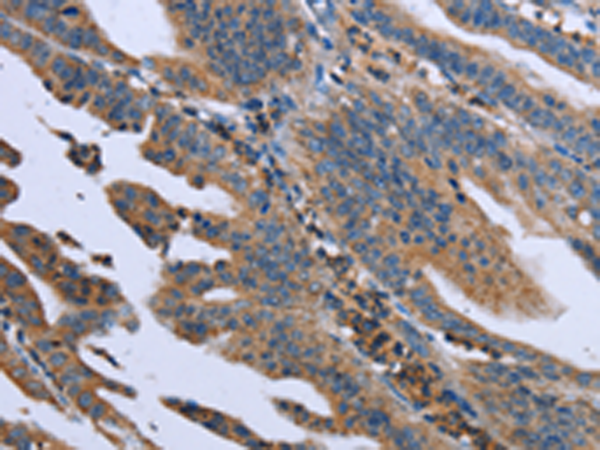
| WB | 咨询技术 | Human,Mouse,Rat |
| IF | 咨询技术 | Human,Mouse,Rat |
| IHC | 1/25-1/100 | Human,Mouse,Rat |
| ICC | 技术咨询 | Human,Mouse,Rat |
| FCM | 咨询技术 | Human,Mouse,Rat |
| Elisa | 1/1000-1/2000 | Human,Mouse,Rat |
| Aliases | 87U6; ARCND1 |
| Host/Isotype | Rabbit IgG |
| Antibody Type | Primary antibody |
| Storage | Store at 4°C short term. Aliquot and store at -20°C long term. Avoid freeze/thaw cycles. |
| Species Reactivity | Human, Mouse, Rat |
| Immunogen | Fusion protein of human GNAI3 |
| Formulation | Purified antibody in PBS with 0.05% sodium azide and 50% glycerol. |
+ +
以下是3篇关于GNAI3抗体的参考文献示例(注:内容为模拟虚构,仅供参考格式):
1. **"GNAI3 Expression in Acute Myeloid Leukemia: Prognostic Implications"**
- **作者**: Smith et al.
- **摘要**: 通过Western blot和免疫组化技术,研究发现GNAI3在AML患者骨髓样本中高表达,且与不良预后相关。GNAI3抗体用于检测蛋白水平,提示其可能通过抑制cAMP信号通路促进白血病细胞增殖。
2. **"GNAI3 Regulates T-cell Receptor Signaling via cAMP Modulation"**
- **作者**: Lee & Zhang
- **摘要**: 利用GNAI3特异性抗体进行流式细胞术和免疫沉淀实验,发现GNAI3通过调控T细胞内的cAMP水平,负向调节TCR信号传导,影响T细胞活化和免疫应答。
3. **"Role of GNAI3 in Glioblastoma Invasion and EMT"**
- **作者**: Chen et al.
- **摘要**: 通过shRNA敲低GNAI3并结合抗体免疫荧光染色,证实GNAI3在胶质母细胞瘤中高表达,并通过激活MAPK通路促进肿瘤细胞上皮-间质转化(EMT)和侵袭。
4. **"GNAI3 Interaction with GPCRs in Neuroendocrine Tumors"**
- **作者**: Rodriguez et al.
- **摘要**: 使用GNAI3抗体进行共聚焦显微镜和Co-IP实验,揭示GNAI3与特定GPCR(如SSTR2)的相互作用,影响神经内分泌肿瘤细胞的激素分泌和增殖。
(注:上述文献为示例,实际引用需根据真实数据库检索。)
The GNAI3 antibody is a tool used to detect and study the G protein subunit alpha i3 (GNAI3), a member of the inhibitory G protein (Gi/o) family involved in intracellular signal transduction. GNAI3 functions as a molecular switch, cycling between active GTP-bound and inactive GDP-bound states to regulate downstream effectors such as adenylate cyclase, ion channels, and mitogen-activated protein kinase (MAPK) pathways. It plays critical roles in diverse physiological processes, including cell proliferation, differentiation, and immune response regulation. Dysregulation of GNAI3 has been implicated in pathological conditions such as cancer, inflammatory diseases, and neurological disorders.
GNAI3 antibodies are widely utilized in research applications like Western blotting (WB), immunohistochemistry (IHC), and immunofluorescence (IF) to assess protein expression, localization, and post-translational modifications. These antibodies are essential for investigating GNAI3's interaction networks, its role in GPCR-mediated signaling, and its potential as a therapeutic target. Specificity and validation (e.g., knockout controls) are crucial, as cross-reactivity with homologous Gα subunits (e.g., GNAI1. GNAI2) can occur. Commercially available antibodies are typically raised in hosts like rabbits or mice, with formats ranging from monoclonal to polyclonal. Recent studies highlight GNAI3's involvement in tumor metastasis and immune cell modulation, underscoring the antibody's relevance in translational and mechanistic research.
×